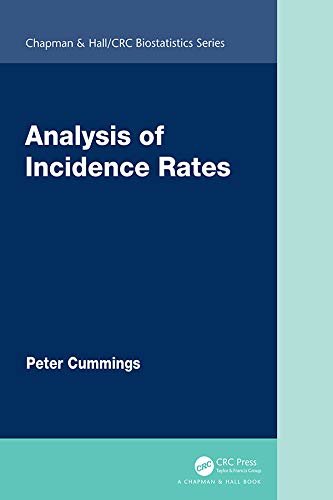
Analysis of Incidence Rates (Chapman & Hall/CRC Biostatistics Series) (English Edition)
- 作者
- Peter Cummings
- 语言
- 英语
- 出版社
- Chapman and Hall/CRC
- 出版日期
- 2019年4月16日
- 纸书页数
- 492页
- 电子书格式
- epub,pdf,mobi,azw3,txt,fb2,djvu
- 文件大小
- 8367 KB
- 下载次数
- 2801
- 更新日期
- 2023-07-13
- 运行环境
- PC/Windows/Linux/Mac/IOS/iPhone/iPad/iBooks/Kindle/Android/安卓/平板
内容简介
Incidence rates are counts divided by person-time; mortality rates are a well-known example. Analysis of Incidence Rates offers a detailed discussion of the practical aspects of analyzing incidence rates. Important pitfalls and areas of controversy are discussed. The text is aimed at graduate students, researchers, and analysts in the disciplines of epidemiology, biostatistics, social sciences, economics, and psychology.
Features:
Compares and contrasts incidence rates with risks, odds, and hazards.
Shows stratified methods, including standardization, inverse-variance weighting, and Mantel-Haenszel methods
Describes Poisson regression methods for adjusted rate ratios and rate differences.
Examines linear regression for rate differences with an emphasis on common problems.
Gives methods for correcting confidence intervals.
Illustrates problems related to collapsibility.
Explores extensions of count models for rates, including negative binomial regression, methods for clustered data, and the analysis of longitudinal data. Also, reviews controversies and limitations.
Presents matched cohort methods in detail.
Gives marginal methods for converting adjusted rate ratios to rate differences, and vice versa.
Demonstrates instrumental variable methods.
Compares Poisson regression with the Cox proportional hazards model. Also, introduces Royston-Parmar models.
All data and analyses are in online Stata files which readers can download.
Peter Cummings is Professor Emeritus, Department of Epidemiology, School of Public Health, University of Washington, Seattle WA. His research was primarily in the field of injuries. He used matched cohort methods to estimate how the use of seat belts and presence of airbags were related to death in a traffic crash. He is author or co-author of over 100 peer-reviewed articles.
Analysis of Incidence Rates (Chapman & Hall/CRC Biostatistics Series) (English Edition) EPUB, PDF, MOBI, AZW3, TXT, FB2, DjVu, Kindle电子书免费下载。
- Smart Data: State-of-the-Art Perspectives in Computing and Applications (Chapman & Hall/CRC Big Data Series) (English Edition) Kuan-Ching Li、Beniamino Di Martino、Laurence T. Yang、Qingchen Zhang
- Principles, Process and Practice of Professional Number Juggling (Working Guides to Estimating & Forecasting Book 1) (English Edition) Alan R. Jones
- Food Production in Urban Areas: A Study of Urban Agriculture in Accra, Ghana (Routledge Revivals) (English Edition) Kwaku Obosu-Mensah
- Finite Geometries (English Edition) Gyorgy Kiss、Tamas Szonyi
- Performance and Practice: Oral Narrative Traditions Amongst Teenagers in Britain and Ireland (Routledge Revivals) (English Edition) Michael Wilson
- The Electroconvulsive Therapy Workbook: Clinical Applications (English Edition) Alan Weiss
- Computational Complexity of Counting and Sampling (Discrete Mathematics and Its Applications) (English Edition) Istvan Miklos
- Formal Methods in Computer Science (Textbooks in Mathematics) (English Edition) Jiacun Wang
- Cryptanalysis of Number Theoretic Ciphers (Computational Mathematics) (English Edition) Samuel S. Wagstaff, Jr.
- Discrete Mathematics: Graph Algorithms, Algebraic Structures, Coding Theory, and Cryptography (English Edition) Sriraman Sridharan、R. Balakrishnan
- 生活即教育 给父母的35堂课 范亚飞,王唯一
- Remaking Housing Policy: An International Study (English Edition) David Clapham
- Planning For Higher Education: Background And Application (English Edition) Allan O. Pfnister
- The Treuhandanstalt and Privatisation in the Former East Germany: Stakeholder Perspectives (English Edition) Jutta E. Howard
- 高考英语3500词汇考点助记 合肥新东方优能一对一部高中英语教研组
- Social Welfare: Why and How? (Routledge Library Editions: Welfare and the State Book 21) (English Edition) Noel W Timms
- The Art of Proving Binomial Identities (Discrete Mathematics and Its Applications) (English Edition) Michael Z. Spivey
- Empirical Likelihood Methods in Biomedicine and Health (English Edition) Albert Vexler、Jihnhee Yu
- Conscience, Expression, and Privacy: The Supreme Court in American Society (English Edition) Kermit L. Hall
- Spatio-Temporal Statistics with R (Chapman & Hall/CRC The R Series) (English Edition) Christopher K. Wikle、Andrew Zammit-Mangion、Noel Cressie
- 词以类记:考研英语词汇 张红岩
- Skill Formation and Globalization (Routledge Revivals) (English Edition) Marcus Powell
- Caravans of the Old Sahara: An Introduction to the History of the Western Sudan (African Ethnographic Studies of the 20th Century Book 9) (English Edition) E. W. Bovill
- Design of Experiments for Generalized Linear Models (Chapman & Hall/CRC Interdisciplinary Statistics) (English Edition) Kenneth G. Russell
- Language and Control (Routledge Library Editions: Sociolinguistics) (English Edition) Roger Fowler、Bob Hodge、Gunther Kress、Tony Trew
- Statistics in Engineering: With Examples in MATLAB® and R, Second Edition (Chapman & Hall/CRC Texts in Statistical Science) (English Edition) Andrew Metcalfe、David Green、Tony Greenfield、Mayhayaudin Mansor、Andrew Smith、Jonathan Tuke
- Analyzing Baseball Data with R, Second Edition (Chapman & Hall/CRC The R Series) (English Edition) Max Marchi、Jim Albert、Benjamin S. Baumer
- Discrete Mathematics with Ducks (Textbooks in Mathematics) (English Edition) sarah-marie belcastro
- Compact Cities and Sustainable Urban Development: A Critical Assessment of Policies and Plans from an International Perspective (English Edition) Gert de Roo、Donald Miller
- The Professionalisation of African Medicine (African Seminars: Scholarship from the International African Institute) (English Edition) Murray Last、G. L. Chavunduka